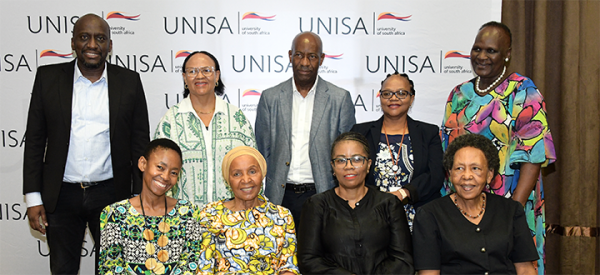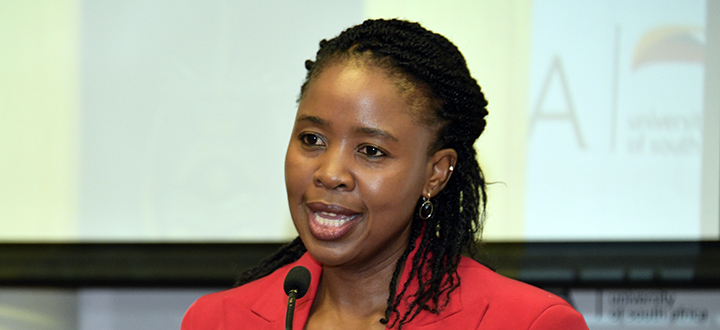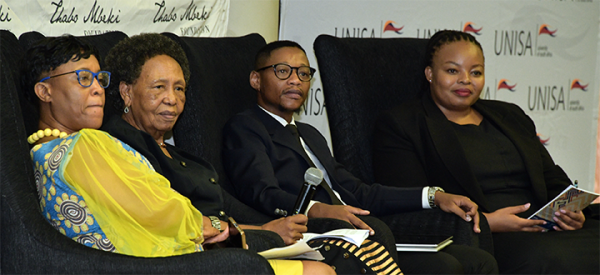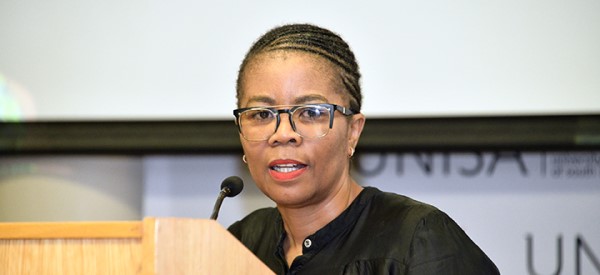
On 25 February 2025, Unisa and the Thabo Mbeki Foundation hosted an International Women’s Day roundtable, themed Accelerate action: Financial inclusion for women in townships and rural areas. This event was aimed at addressing the serious challenges that women in the rural and township areas face, with discussions centred on finding long-term solutions, specifically on economic empowerment, in order to achieve full gender parity.
This event was attended by Zanele Mbeki, founder of Women’s Development Business (WDB) Trust, and wife of Unisa Chancellor, Dr Thabo Mbeki. In attendance also were the Unisa Women’s Forum (UWF), Riah Phiyega, CEO of WDB Trust, Women Investment Portfolio Holdings (WIPHOLD) members, and various dignitaries from academia and the diplomatic corps.

In attendance at the International Women’s Day roundtable discussion, seated: Mabatho Nakene-Mginqi, Chief Information Officer and Vice-Principal: Information and Communication Technology; Zanele Mbeki, Founder of the DWB Trust; Prof Puleng LenkaBula, Unisa Principal and Vice-Chancellor; and Dr Anne Letsebe, Trustee of WDB Trust.
Standing: Matsiababa Motebele, Vice-Principal: Facilities and Estates; Prof Eunice Seekoe, Acting Vice-Principal: Teaching, Learning, Community Engagement and Student Support; Prof Moloko Sepota, Acting Registrar; Dr Matshidiso Molapo, Vice-Principal: Strategy, Risk and Advisory Services; and Riah Phiyega, CEO of WDB Trust.
In her welcome address, Prof Edith Phaswana, Acting Executive Dean of the Thabo Mbeki African School for Public and International Affairs, said that this year marks the 50th anniversary of International Women’s Year. In addition, Phaswana explained that this year marks the 30th anniversary of the Beijing Declaration – a resolution adopted by the United Nations (UN) to promote gender equality, which, she said, is universally recognised as the world’s most comprehensive visionary plan ever created to achieve the equal rights for all women and girls.
Phaswana continued elaborating on the historical contexts leading to global gender equality laws: "In 1995, an important milestone was achieved when 189 governments agreed to rectify the Beijing Platform of Action, addressing 12 areas of concern, which include advancing women’s rights and empowering women globally, among others. And on the 8th of December in the same year, the UN General Assembly, at its 6th plenary meeting, adopted the resolution to endorse the Beijing Platform of Action. These landmark agreements took place at the Fourth World Conference on Women that took place in Beijing, which consolidated five decades of legal advances aimed at securing equality of women and men in law and practice," she stated.
Concluding, Phaswana stressed that these monumental achievements laid the foundation for the ongoing efforts to achieve gender equality and to ensure that women’s rights are not just recognised but are continuously upheld across the globe as expressed by the declarations.
In her keynote address, Norah Sehunoe, Executive Head of Human Resources at Santam, stressed that in the 30 years of democracy, the gender gap could have improved or even completely closed. "However," she said, "reality tells us many challenges faced by women prior to democracy continue to impact women today. We still have women who have no voice and continue to suffer in silence."

Keynote speaker Norah Sehunoe, Executive Head of Human Resources at Santam
Sehunoe drew from the adage, Give a man a fish and you feed him for a day; teach a man to fish and you feed him for a lifetime, arguing that empowering women through financial education is a vital strategy for broader economic inclusion. She emphasised that teaching a woman financial skills are not just about individual gain, but rather, it's about fostering national prosperity. She explained: "When you teach a woman how to fish you are enabling her to feed the entire nation."
Furthermore, Sehunoe pointed out that women's pursuit of financial inclusion is often driven by a desire to provide for their families, not for personal enrichment. She stated: "Unlike many, women’s motivations are rarely selfish, therefore, by empowering women, you are effectively empowering entire communities."
"According to the World Economic Forum," said Sehunoe, "gender parity will not be achieved until 2158. None of us will be alive in that year, therefore, we are solving a problem that we are not necessarily going to entirely benefit from. However, we are sowing for the generations coming after us."
She continued: "This statistic underscores the urgency to intensify efforts towards gender equality. Our own journey has taught us that the voices of women are powerful and can never be silenced. As women it continues to remain our responsibility to continue writing new chapters in our history and to challenge outdated views, challenge the status quo, and break the glass ceiling in the corporate world."
Sehunoe stressed that since 1994, women have managed to achieve roles in all sectors of society, however, she said much work still remains in closing the gender gap and in ensuring that women take their rightful place in all three sectors of the economy, particularly for women in townships and rural areas.
Concluding, Sehunoe said the overarching theme for this year declared by the UN, Accelerate action, "calls for a need to take swift and decisive steps to overcome systemic barriers that women face in all spheres of life. Collectively we can expedite progress and bring forward the realisation of gender parity within our generation and lay a solid foundation for our future generation so that when we hand over the torch, the light is still bright for them to carry on with."
Following the keynote address, a roundtable discussion took place during which Dr Anne Letsebe, Trustee of WDB Trust, Prof Cameron Modisane, Acting Executive Dean of the College of Accounting Sciences, Unisa, and Dr Nthabeleng Mmako, College Coordinator: Postgraduate Studies in the College of Economic and Management Sciences, Unisa, made salient points regarding women empowerment.

Roundtable panellists: from left: Prof Edith Phaswana, Acting Executive Dean of the Thabo Mbeki African School for Public and International Affairs; Dr Anne Letsebe, Trustee of the WDB Trust; Prof Cameron Modisane, Acting Executive Dean of the College of Accounting Sciences; and Dr Nthabeleng Mmako, College Coordinator: Postgraduate Studies in College of Economic and Management Sciences
Their conversations centred on key challenges and opportunities regarding gender parity, particularly within rural and township communities. Through a question-and-answer session, the panellists explored salient points such as access to education, economic opportunities, healthcare, leadership roles and cultural barriers, and the achievement of equality through the lens of the Beijing Platform of Action’s 12 critical areas of concern, among others.
Concluding their discussions, the panellists highlighted the urgent need for interventions and community-based solutions to address the said challenges faced by women post 30 years of democracy, and to accelerate progress towards meaningful and sustainable gender parity.
In her closing address, Unisa Principal and Vice-Chancellor (VC), Prof Puleng LenkaBula, thanked Zanele Mbeki as the heroine of women empowerment, stating that her works, including the consciousness she has created among women, continues to motivate them to become agents of change in the society.

Unisa Principal and Vice-Chancellor, Prof Puleng LenkaBula
Continuing, the VC thanked Phaswana and her team for the success of the event, stating that the reflections from this event have academic weight, and must be written and cited in topics involving gender parity.
Concluding, the VC stated that Unisa remains committed to the gender and feminist discourse that Zanele Mbeki is popularly known for in the country and globally, and that the university continues to advocate for and uphold gender parity policies and practices.
* By Godfrey Madibane, Acting Journalist, Department of Institutional Advancement
** Photography by Shooheima Champion, Multimedia Centre
Publish date: 2025/03/04